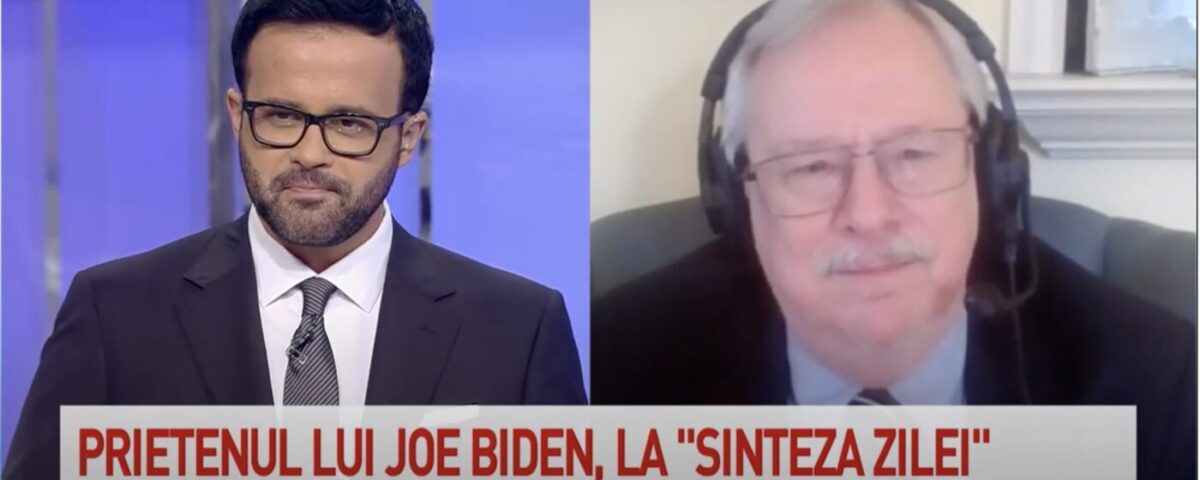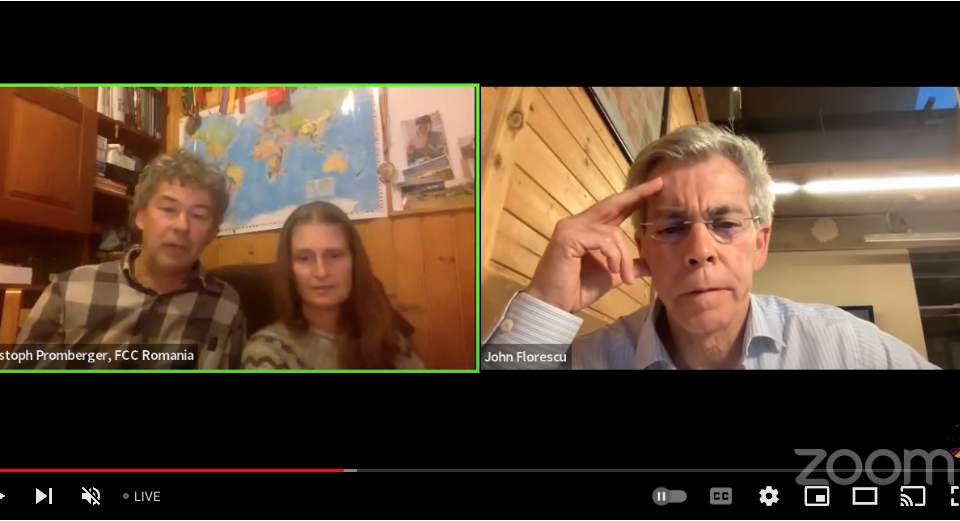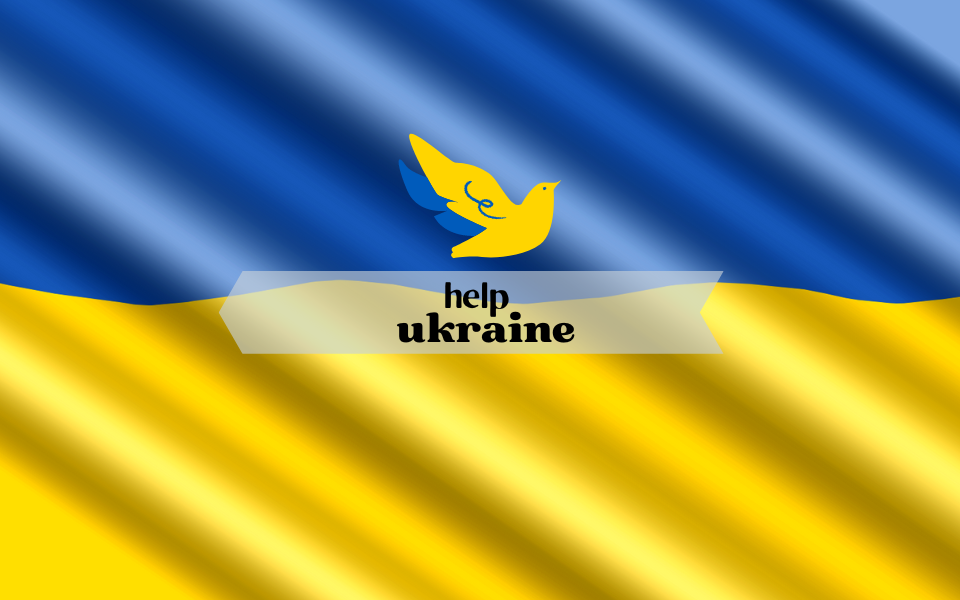The interview originally aired on January 22 on Antena 3.
Mihai Gâdea: Your excellency, thank you very much indeed to have you tonight in this show. I’m so happy for this opportunity. I was telling the audience about your feelings for Romania, but I was also telling them about your relationship with the new president. So, let’s start the conversation from this point.
Q: What can you tell our viewers about the new President, how should we know him through your eyes?
Jim Rosapepe: Well, thank you very much for inviting me and it is a very exciting day for those of us who have worked with President Biden over the years, and obviously for those who care a lot about the United States as well as care about Romania. He’s a man, as everybody knows, of very broad experience particularly in international relations, former chairman to the Senate foreign relations committee in the Congress. When I was Ambassador, I worked with him closely on all the issues related to Europe, to NATO, to the war in Kosovo which was going on when I was Ambassador, to bringing democracy to the Western Balkans, and working closely with Romania. And as you know, then back under President Obama when President Biden was Vice President Biden, he came to Romania and worked very closely with then Ambassador Mark Gitenstein who has been his partner in policy in the United States for about 35 years. Ambassador Gitenstein was one of the leaders of the transition team for President Biden, and so his ties to Romania are very very strong.
Q: I know that he is in love with two Romanians, Ilie Nastase and Nadia Comaneci. When he came to Romania as Vice President, the government was inviting Ilie Nastase to have a meeting with the Vice President. When President Biden was looking at Ilie, he was screaming, “Oh! I was a fan of you all my life!” We have a picture from that moment. Also, I know that Nadia Comaneci is very close with the Bidens. You said before that President Biden knows Romania, knows the region, what should we expect from President Biden from his new administration?
A: Well I think there’s several things of particular significance to Romania. One is a recommitment by the United States to the NATO alliance. There are very few issues that are more important to Romania from a security point of view than the NATO alliance, and he has been a champion of the NATO alliance. He was a champion of inviting Romania to join NATO, and I know he and many of us have had concerns about NATO’s strength and stability over the last several years. So, I think you’re going to see a recommitment to NATO, so I think that’s probably number one and the most important thing for most Romanians. But I also think more generally his understanding about Europe. He understands that Europe is the major ally of the United States in the world, that because of our shared democratic values we have disagreements about things from time to time, but fundamentally we’re close partners. I think re-strengthening that whole relationship with Europe will be important for Romania as well. But then finally, you mentioned two of the Romanians who he knows and likes, I can assure you there are many more Romanians and likes many more Romanians in addition to Ilie and Nadia as much as he likes them. The main thing is he has been to Romania four or five times, which is more than most Presidents of the United States have been to Romania by the time they become President or even when they are President. So, Romanians know him and he knows Romania and that’s going to be a very big deal.
Q: What should we expect differently? President Trump didn’t come to Romania but he invited our President, President Iohannis, twice to the White House. We had a very good relationship these past four years , of course on programs of defense and a lot of important things. What should we expect differently from this point?
A: Well I think that’s true. I think there were quite a number of initiatives that were continued by the Trump administration that had been begun in earlier administrations, including the George W. Bush administration, the Obama-Biden administration, and frankly Bill Clinton’s administration which I worked in. So, I think there’s a real continuity of foreign policy of the United States towards Romania. I don’t think you’ll see change in a dramatic sense of a different approach. The military alliance is important, the economic partnership is important, the shared values are important. But I think what you will see is when issues come up that are tough issues, you’re just going to see a President of the United States who knows more about Romania. Therefore, in addition to the advice he’ll get from whoever the new Ambassador is, and I’m sure he’ll choose a terrific Ambassador to Romania, and whatever advice he’ll get from his cabinet members, he’ll be able to process it in his own head based on his own experience and his own knowledge. I think that’s good for the United States and I think that’s good for Romania.
Q: My colleague Adrian Ursu is here with us, if you have a question Adrian.
Adrian Ursu: I’m very honored to be here with you. We met each other many years ago when you were Ambassador, now I have the honor to have an interview with you. I have two questions that I think are generally speaking points of interest for our Romanian audience. First of all, do you have any information on why the former Ambassador Zuckerman left Romania so fast even before the inauguration ceremony of the new President elect of the United States?
A: I don’t know specifically but it is the tradition in American diplomacy that all Ambassadors, whether they are career Ambassadors for the foreign service or non-career Ambassadors, as I was and as Ambassador Zuckerman was, to basically submit an undated resignation at the end of a presidential term so that the incoming President can decide who he wants to be his personal representative to the country. So, it’s not surprising that he stepped down and that there will be a new Ambassador coming.
Q: We hope it will be a short procedure because we have waited almost one and a half or even two years to have a fully charged Ambassador in the former mandate. The second question is about the one sad experience that Romanian citizens have regarding this administration. It has a name, it’s Victoria Nuland, the special envoy for Eastern Europe, which was regarded as a special envoy who was involved too much in the internal politics of Romania. Do you think this has passed, this kind of involvement, or are there signs that it will be different in this new Biden administration?
A: Well I don’t speak for the Biden administration obviously, but I think the big point is that the United States is very committed to democracy and to sovereignty, Romania is very committed to democracy and sovereignty, and I think the record of President Biden is very clear. That he cares a lot about what happens in our partner countries, he cares about it economically, he cares about it in terms of protecting our democracy. As all the world has seen, we had some people who were making some threats to our democracy in the United States but we bounced back. They stress tested American democracy but we came through with flying colors. Romania has had similar kinds of experiences and most countries in the world have had those kinds of experiences. But I think the focus is going to be on protecting democracy in our country and around the world. The specifics of who’s going to be involved and what, the president’s only been on the job for a day so I think those issues will be sorted out over the coming months.
Q: The last question is when are you planning on visiting Romania again? And if you have any inside information about how quickly we can organize for President Biden to come to Romania?
A: Again that I don’t know the answer to. We have to get a new Ambassador to Romania and that will take a while. Obviously I would love for President Biden to visit once again and certainly would encourage him to do so. For myself, it’s all dependent on the virus and the vaccines in the United States, in Europe, and in Romania. We talk about political differences, but one powerful force in the world that doesn’t understand political differences or borders is the virus. And this is why we need international cooperation. As soon as we beat the virus, I look forward to coming back and visiting Romania.
Q: I was saying in the beginning that we are very lucky to have you tonight in this interview because you know President Biden very well. Of course these days, like yesterday, a lot of people were watching inauguration day. Talking in terms of news channels, we’ve been number one by far broadcasting the events and Romanians were eager to watch the ceremony. You know very well how close the Romanian people are with Americans and America is very important to us. Could you tell our audience one memory, something that will be relevant for us to understand what kind of man President Biden is?
A: Well I think the most important thing to understand about President Biden is that he is sincere, he is straightforward. When he says something, take it seriously. Whether it’;s a compliment or sometimes a criticism, he means what he says and he says what he means. And when he said yesterday in his speech that American democracy has shown its resilience, when he said that the United States is recommitting itself to protecting democracy around the world, he meant it. When he said that in a democracy we can have disagreements and we should have disagreements, that’s what democracy is about. But we have to be unified in support not only of our own country and in vision of our own country but in terms of working together across national borders on things like the virus, on things like climate change. So I think what you heard yesterday is what you would have heard from President Biden if he was talking to you one-on-one in private.
Q: In your opinion, what is the biggest challenge for our region for the next period of time?
A: Well frankly I think it’s the virus crisis and the economy. You know it very well in Romania and we know it very well here in the United States. It’s a once in a hundred years crisis. It’s great that the vaccines are coming out fast, but people are dying, people are suffering, people are afraid, and it’s hurt the economy as well. I think that’s the focus, and that certainly is President Biden’s focus both in the United States and internationally. One of the issues is are we going to solve this virus internationally because if you solve it in one place, it’s going to come back in another place. So I think that’s really where the focus should be.
Mihai Gâdea: Your excellency, thank you very much for accepting this interview. I have to tell you that the translator I chose for tonight is your former translator from the embassy. If you remember Catalin, he is translating you tonight so I was making sure that your words would be translated very well in Romanian. Thank you very much ambassador.






